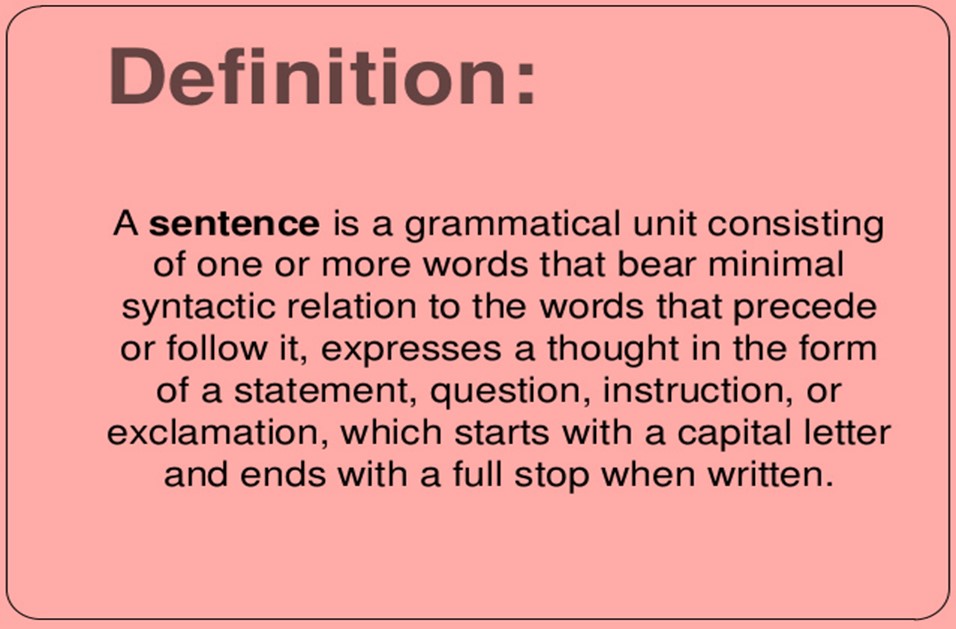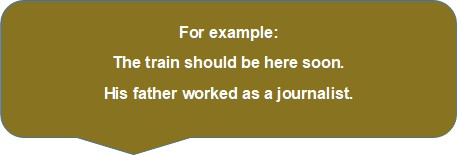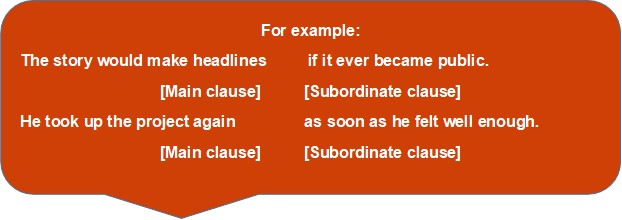
A sentence is a group of words that makes complete sense, contains a main verb, and begins with a capital letter. Sentences are used:
I took some money out of the bank.
The shop stays open until 9 p.m.
Can I help you?
Could you open the door?
Stop arguing!
Come here at once!
You’re driving too fast!
It’s so cold!

Sentence or not?
The examples in the section above all show well-formed sentences. None of the following examples are proper sentences:
‘Ham and eggs. And onions.’
Too much information!
‘Not at all, Joe.’
They are not sentences because they do not contain a verb: they would be acceptable in informal speaking and writing because they are easy to understand, but it's not a good idea to use such constructions in formal situations.

Simple sentence
A simple sentence normally contains one statement.

Compound sentence
A compound sentence contains two or more clauses of equal status, which are normally joined by a conjunction such as and, or, but. For example:
|
Joe became bored with teaching |
And |
he looked for a new career. |
|
[main clause] |
[conjunction] |
[main clause] |
|
Boxers can be very friendly dogs |
But |
They need to be trained. |
|
[main clause] |
[conjunction] |
[main clause] |
|
|
|
|
Complex Sentences
A complex sentence is also made up of clauses, but in this case, the clauses are not equally balanced. They contain a main clause and one or more subordinate clauses.

A set of words that is complete in itself, typically containing a subject and predicate, conveying a statement, question, exclamation, or command, and consisting of the main clause and sometimes one or more subordinate clauses.
The Four Types of Sentence
There are four types of sentence.
A declarative sentence: A declarative sentence states a fact and ends with a period / full stop. For example:
An imperative sentence: An imperative sentence is a command or a polite request. It ends with an exclamation mark or a period / full stop. For example: When a dog runs at you, whistle for him
An interrogative sentence: An interrogative sentence asks a question and ends with a question mark. For example: Who knew that dog saliva can mend a broken heart?
An exclamatory sentence: An exclamatory sentence expresses excitement or emotion. It ends with an exclamation mark. For example: In Washington, it's a dog eat dog. In academia, it's exactly the opposite
The Four Sentence Structures
A sentence can consist of a single clause or several clauses. When a sentence is a single clause, it is called a simple sentence. A sentence must contain at least one independent clause. Below are the four types of sentence structure.
A complex sentence has an independent clause and at least one dependent clause. For example:
A compound sentence has at least two independent clauses.

A Compound-Complex Sentence: A compound-complex sentence has at least two independent clauses and at least one dependent clause. The shortest sentence in English: "Go."
Recap
Q.1 |
Rearrange the following jumbled words/phrases to make meaningful sentences. A) Starving for/ B) They / C) are / D) Food. |
| a) | BCAD |
| b) | ABDC |
| c) | BDAC |
| d) | BACD |
Q.2 |
Rearrange the following jumbled words/phrases to make meaningful sentences. A) non violence/ B) was a/ C) follower of/ D) Mahatma Gandhi. |
| a) | ABCD |
| b) | DBCA |
| c) | BACD |
| d) | ABDC |
Q.3 |
Rearrange the following jumbled words/phrases to make meaningful sentences. A) Lost my/ B) I/C) Wallet in/ D) Bus. |
| a) | DCAB |
| b) | BDCA |
| c) | ABDC |
| d) | BACD |
Q.4 |
Rearrange the following jumbled words/phrases to make meaningful sentences. A) Indian and/ B) were served/ C) in the party/ D) Chinese meals. |
| a) | BCAD |
| b) | CDAB |
| c) | ADBC |
| d) | ABCD |
Q.5 |
Rearrange the following jumbled words/phrases to make meaningful sentences. A) Some money/ B) I asked/ C) lend me/ D) her to. |
| a) | BDCA |
| b) | CDAB |
| c) | ABCD |
| d) | DCBA |
Q.6 |
Find the right sequences of the sentences. P: on Sunday morning Q: to see whether it was time to go R: to play football S: Rahul jumped out of his bed |
| a) | PSQR |
| b) | SQPR |
| c) | PQRS |
| d) | PRQS |
Q.7 |
Find the right sequences of the sentences. P: that appears to be his biggest contribution to American policy. Q: The hour-long speech came as a last rallying cry before November's health insurance open-enrollment period R: and a bit of valedictory for the law. S: the last such period of the Obama presidency. |
| a) | RSPQ |
| b) | QSRP |
| c) | PRQS |
| d) | SQPR |
Q.8 |
Find the right sequences of the sentences. P: served as ports and trading centres in the Maurya and Gupta empires Q: Gujarat's coastal cities, chiefly Bharuch and Khambhat, R: and during the succession of royal S: Saka dynasties from the Western Satraps era. |
| a) | QPRS |
| b) | RSPQ |
| c) | PRQS |
| d) | SPQR |
Q.9 |
Find the right sequences of the sentences. P: travelling the world Q: who is now a citizen of Saint Kitts and Nevis, R: in self-imposed exile S: Telegram is supported by the Russian-born entrepreneur Pavel Durov, |
| a) | QPRS |
| b) | PQRS |
| c) | PRQS |
| d) | SQPR |
Q.10 |
Find the right sequences of the sentences. P: is only given by mouth because of its acidic stability. Q: Benzylpenicillin, procaine penicillin and benzathine penicillin R: but phenoxymethylpenicillin S: can be given by intravenous or intramuscular injections, |
| a) | PRSQ |
| b) | RSQP |
| c) | QSRP |
| d) | RPQS |
Your Score: 0/10
Yearlong program for Olympiads preparation & to build necessary skills for future.
Explore More
Time to mark your calendar with the upcoming Olympiads exam schedule.
Explore More
Take your Olympiad preparation to next-level by taking LIVE Classes.
Explore More
Assess your performance by taking topic-wise and full length mock tests.
Explore More
Online tuitions for international compeitions like SASMO, SEAMO, etc for Grades 1-11.
Explore More